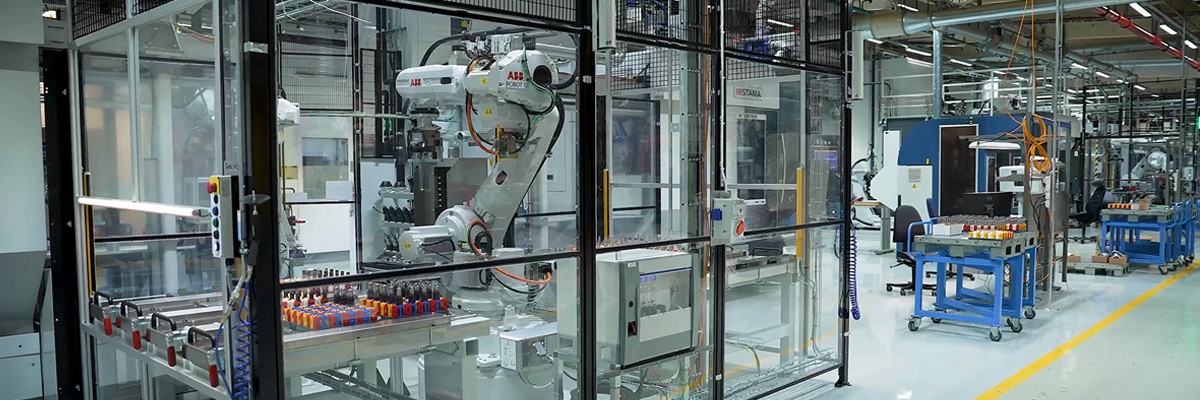The Gimo, Sweden production facility of Sandvik Coromant, a leader in the design and manufacture of premium metal-cutting tools and machining technology, is tapping into the extensive benefits of VERICUT Force from CGTech. The company is using this advanced physics-based software, which analyses and optimises cutting conditions during component machining, to deliver significant savings in both cycle time and energy consumption. The results are nothing short of impressive.
Sandvik Coromant’s Gimo production plant manufactures tool bodies (holders) for indexable-insert cutters used in milling, drilling and turning operations. The facility produces a catalogue of around 15,000 standard products, as well as customised tools. However, Gimo is no ordinary plant. In 2019, the World Economic Forum recognised the factory as just one of 16 digital ‘lighthouses’ worldwide for the fourth industrial revolution (Industry 4.0). And it is clear to see why.
The Gimo site is up and running 8,760 hours per year and features extensive automation. In fact, the whole night shift is unmanned, operated by hundreds of industrial robots and automated guided vehicles (AGVs). Furthermore, a digital ‘thread’ runs throughout the factory that automates everything from customer order to despatch, with data feedback from production to the company’s systems supporting process analysis and continuous improvement.
“When a customer places an order it triggers an automated design process based on parametrics,” explains Sandvik Coromant Production Engineer Björn Ljunggren. “The next step is preparation for production, namely the automatic generation of programs for robots, measuring systems and machine tools. Machine programming includes comprehensive verification and simulation using VERICUT.”
Stable means able
VERICUT ensures stable processes, which are essential for unmanned operations. The site has been a VERICUT user for over 10 years, recording no machine crashes in that time. Now, the Gimo factory is introducing VERICUT Force for program optimisation to this part of its automated process.
At Gimo, the whole set-up simply runs by itself in the plant’s specially created automated batch mode environment. There are no design engineers or production engineers sitting in front of CADCAM stations. Instead, the system determines everything automatically, including workpiece material and lead-time requirements.
While machining optimisation using VERICUT Force serves to reduce cycle time, the Gimo site wants to leverage the benefits of this increasingly popular software to help with a bigger ambition: becoming carbon-neutral by 2035.
“Our goal is energy-efficient manufacturing - reducing energy consumption and increasing sustainability,” explains Mr Ljunggren. “That’s why we’re moving beyond simulation and verification to optimisation with VERICUT Force. Reduced production time and energy-efficient manufacturing go hand-in-hand.”
Time will tell
The reduction of program time using VERICUT Force relates to less spindle time, fewer motors running, less coolant pumps in use and so on. As a factory, Gimo monitors its energy consumption very closely. This busy site currently consumes 56-58 MWh of electricity every day. To draw a comparison, UK energy regulator Ofgem estimates that a typical household in England, Scotland and Wales uses 2.7 MWh per year.
To assess VERICUT Force, Sandvik Coromant requested a trial involving the machining of a popular drilling product, CoroDrill® DS20. The material for this drill is a premium tough steel with a high hardness value. Machining took place on a new STAMA CNC vertical machining centre featuring a number of sensors that help monitor electricity consumption, not just of the machine, but also the compressed air system, high-pressure coolant pumps and so on.
Show of force
The trial involved the use of VERICUT Force on roughing operations, predominantly adaptive milling and slot milling in the chip space and flutes of the drill, while running the VERICUT Air Cut Optimization module on remaining compatible operations. Advanced data management software at the Gimo site logged all machine data for comparison purposes.
“When running VERICUT Force optimisation we saw a 15% reduction in energy consumption: that was our bottom-line result for the whole machining process,” states Mr Ljunggren. “Of course, it depends on what components we run, our running hours and the price of a kWh.”
To provide transparency, the calculation was based on machining three drill holders per hour, with the machine running 16 hours a day. Comparing data from before and after VERICUT Force optimisation revealed a 0.59 kWh saving per workpiece: a 15.3% reduction. This equates to a saving of 1.77 kWh per hour and more than 10,000 per year. At an electricity price of 28 cents per kWh the financial saving would translate to €3,000 per machine, per year.
This outcome shows that a typical machine shop running 10, 20 or 30 machines can achieve savings of up to €30,000 10 machines, €60,000 20 machines or €90,000 on 30 machines per annum based solely on reductions in energy consumption. Further savings will result from faster cycle times, extended tool life and increased capacity.
Massive potential
With the trial based on just one machine, the potential net effect for Sandvik Coromant’s Gimo facility is huge, both in terms of financial savings and sustainability. The factory is home to around 400 machines.
“Of course, some extra savings come from a reduction in cycle time,” explains Mr Ljunggren. “With Force optimisation our trial showed a total cycle time reduction of 12% for the drill bodies.”
The Gimo facility is now in the process of rolling out the use of VERICUT Force optimisation to other drill product families. Two cells housing six machines already run the software; this will rise to 11 machines by the summer of 2024.
“Force doesn’t take long to learn: you basically select the material, specify some optimisation parameters and just run it. We had great support from CGTech throughout the adoption process, both globally and here in Sweden, which really helped ensure the success of this project.”
 Germany
Germany Italy
Italy USA
USA South Korea
South Korea UK
UK India
India France
France China
China Japan
Japan
